Worth It, Every Time: Why Travel Changes Us
Part 2 of visiting Morocco with a stranger I met online
In case you missed Part 1:
A few weeks ago, I flew to Morocco to meet a stranger I’d only talked to online—a fellow traveler named Reem who I connected with over a shared love of adventure and spontaneity. We met for the first time in Marrakesh and spent 10 days crossing the country, from medinas to desert dunes. Part 1 of this story captured the magic of that leap of faith. Now, in Part 2, I’m digging into what it really felt like to navigate Morocco: the chaos, the beauty, the confusion…and the lessons we learned when we stopped trying to make sense of it all.
Organized Chaos
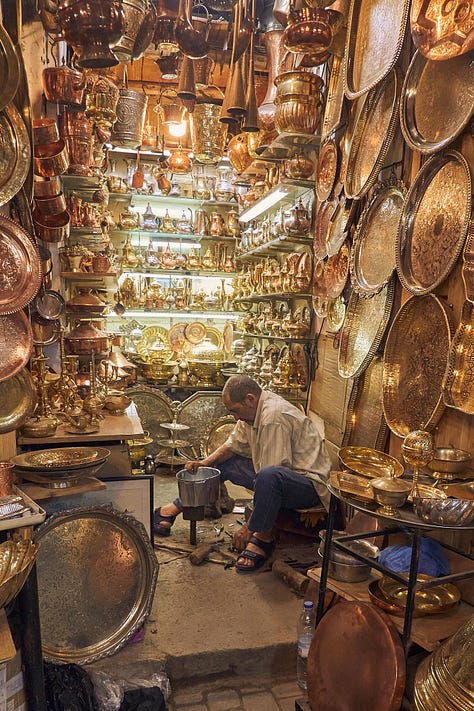
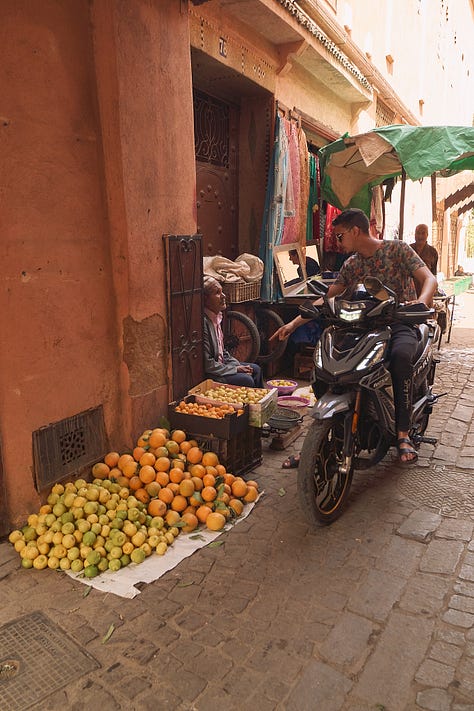
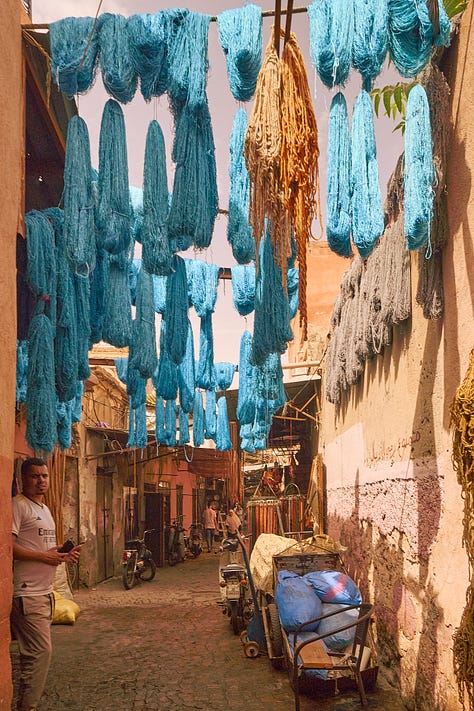
There is a shock upon arriving in Marrakesh. All senses are stimulated. There are donkeys pulling carts, snake charmers with cobras in the square, and even the simple task of crossing the street seems insurmountable. Our riad owner called it, “organized chaos”.
What we learned was that the “organized chaos” was not reserved strictly for Marrakesh, but applicable to describe the entire country. As someone who has traveled to other chaotic countries like Cuba, Colombia, and Turkey… Morocco is it’s own category.
I can say, however, that my experience in those countries prepared me for Morocco. The haggling, yelling, and verbal harassment was way more intense in the Grand Bazaar of Istanbul. The catcalling and men trying to follow me or guide me somewhere was way worse in Havana, and the vigilante mode is always more alert in Colombia. What makes Morocco different was its chaotic contradictions.
Entering the Maze
The medina of Marrakesh is where our story begins. The labyrinth of narrow twisting and dead-end streets are a daunting mystery to the visitor once they realize GoogleMaps is quite ineffective. But the locals know them like the back of their hand.
Turns out these mazes of car-less tiny streets were designed intentionally for making it difficult for invaders to navigate. The architecture helps for climate control and air circulation. In fact we hardly felt the 95ºF (35ºC) temperatures. The shaded alleys and tall buildings provided wind and a cooling effect. You just had to be on alert at all times because the alleys are so narrow you could easily get run over by motorcycles and donkey carts. A few times we had to plaster ourselves against a wall to not get run over!
My favorite part of the medina IS the chaos. I was in Marrakesh a day before Reem arrived and the best part of the day was sitting at a street cafe and people-watching. I sat there for 3 hours sipping coffee after coffee and just observing. It was here that I noticed the tea-runners (at least that’s what I call them). People who bring tea to all of the venders in the medina who are working. They run around balancing trays of tea and take it to all the different merchants.
For centuries the people here have been merchants and tradespeople. There is a reason why haggling is part of the culture and why they are such good vendors. If you look closely, there is also a system to the madness. For instance watching products being transported by motorcycle and donkeys since no cars can reach the medina. Or how it may look disorganized at a glance, but in reality it’s organized by souks based on the trade and craft.
I loved admiring all of the workshops, craftspeople, and quotidian life. People making leather shoes, weaving carpets, dyeing fabrics, tinkering with brass, and master wood craftsman— all packed into high-density space. But while one street is bustling, one wrong turn of a corner and you can find yourself in a sketchy looking dead-end street where we were warned danger could be lurking.
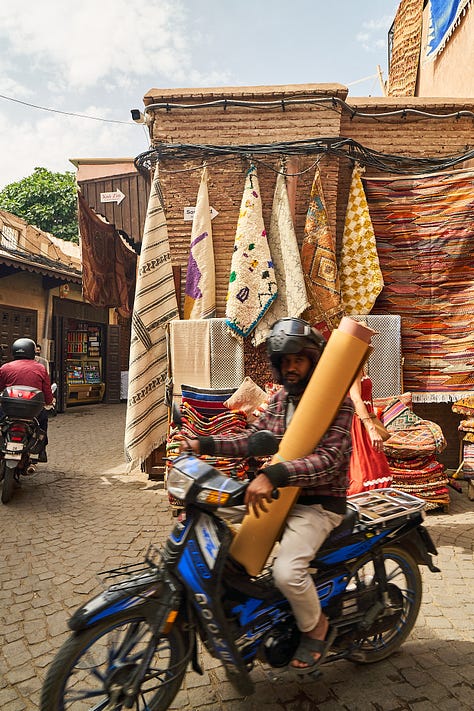
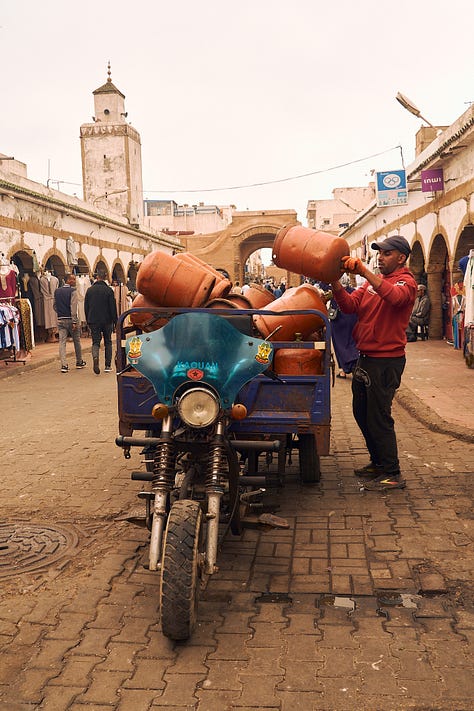
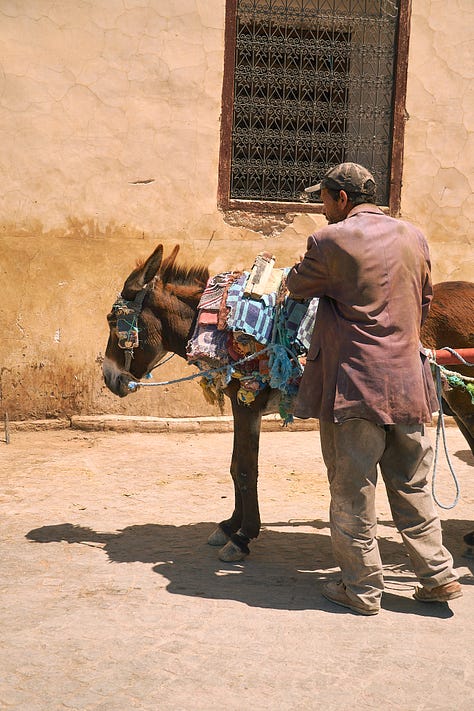
A-Mazing and Chaotic
This metaphor of a maze is how I would describe our experience of Morocco. Constantly disorienting. Some days we experienced direct connections and meaning, while other days were cultural-dead ends and disappointing interactions.
What surprised me most was how the mass-tourism industry has shaped the country. Tourist menus with different prices and tourist only restaurants were everywhere especially on the road to Merzouga. As someone who enjoys authentic local experiences, this made it difficult to navigate. At times it felt to me as the famed Moroccan hospitality may be of a bygone era. But I knew I was challenging my own assumptions and that while that was in the case in more situations than I expected, it was certainly not the case for all.
For instance, one afternoon in Marrakesh, we found refuge from the heat in a small coffee shop making coffee on sand from the Sahara. The owner was warm and welcoming, and our exchange didn’t feel transactional. He even surprised us with extra smoothies (and he gave me the recipe at the end!) expecting nothing in return. That kind of kindness stayed with us especially when contrasted with other moments, like when Reem bought bracelets in the souk and we later realized we’d been overcharged for low-quality pieces. Morocco constantly asked us to hold both truths at once.
During my trip, I was reading a book called The Caliph’s House by Tahir Shah. The book was comforting to our confusion. It explains that in Morocco, there is no common sense, and the only way to be at peace with that is to stop having common sense yourself. If you want to get anything done, you have to play the game. In order to live alongside the chaos, you have to partake in the chaos. Once we understood this, life got a bit easier.
It takes a while to get over the initial shock of the madness. It’s the rite of passage. But after that, it’s a matter of inviting the chaos to enter you. It’s no use trying to understand the chaos, you have to become part of it.
By the end of the trip we were haggling prices, yelling aggressively “LA! LA!” (No! No!) to men trying to talk to us, and “La shukran” (no thank you) to kids trying to sell us stuff. We shut our eyes and walked straight into traffic like locals do, somehow trusting the traffic stops. It always did. We fought our way into restaurants to order food, and we accepted the fact that that taxi rides are always shared and you will take many detours along the way. (Fun fact now I’m in Paris and I feel the urge to cross the street like in Morocco, only here it doesn't work that way!)
The other challenge was the language. The Arabic dialect in Morocco is different from other Arab countries. My friend Reem is Lebanese, so she spoke Lebanese Arabic or formal Fusha with locals when possible. I often defaulted to Spanish. We’d translate for each other in English, creating our own little multilingual loop. At times, conversations would zigzag from Berber to Arabic to English—or Berber to Spanish to English. Somehow, we made it work.
Desert Detour
Just when we were getting used to Marrakesh, it was time for the journey to the Sahara. This is where things got strange. We were crammed into a bus with other travelers and the driver didn’t speak to us at all. Luckily we snagged the seats in the front next to the driver so we got air conditioning and views for all 9 hours of the drive.
For the shared bus, we would get randomly dropped off at different towns and handed off to various tour guides who’d show us around but not actually tell us anything interesting. We were rushed from place to place and then expected to pay for the “tour.”
The silver lining about being on the shared bus was getting to know fellow travelers. I also got to speak Spanish, practice Italian, and exchange a few words in French, Turkish, Japanese, and Chinese. At some point, someone connected their phone to the speakers and we started passing it around, sharing music from our respective countries and turning our bus ride into an impromptu cultural exchange through sound.
One of the Turkish travelers and I struck up conversation and when she said she lived in Istanbul, it occurred to me to ask if she’d be open to becoming a letter carrier and helping deliver a postcard to a friend who lived there. Incredibly she said yes and a week later, hand-delivered my card. “Faster than Fedex!” she said.
About 5 days after we had split from the bus group, Reem and I were eating in a restaurant in Chefchouen on the other side of the country, when we randomly ran into two other travelers from our former bus. Turns out they had a car this time and we went with them to a waterfall and riverside picnic for an entire day.
So, while the shared tour often felt like being herded from one tourist trap to the next, the real highlight wasn’t the sights. The true gift was the new friendships, cross-cultural exchanges, and the unexpected ways our paths crossed again.
Worth It, Every Time: Why Travel Changes Us
When we travel we are often left with more questions than answers. That was my experience with Morocco. I felt that I needed more time to understand the country, but at the same time it felt like you could spend decades there and still not understand it.
When people ask if Morocco is worth visiting, I’d say there’s only one way to find out. Go. These are places words cannot describe. Everyone’s experience is vastly different and there are conclusions only your eyes, ears, and heart can experience and decide. We can ask all of Reddit, ChatGPT and friends what they think of the country, but the only way to really find out is to go see for yourself. There will be always be things we like and dislike from a place. But I believe it’s always worth it to try and discover it.
Travel also isn’t just about discovering physical places, it’s about discovering new places within ourselves. Part of that growth is being tested by challenges while on the road. Though the traveler can get weary and lost, that’s when we learn the most. To trust our intuition, accept help from those around us, experience awe and joy, challenges and heartbreak. With traveling, we see it all. Not just around us, but within.
In the end, Morocco wasn’t just about the country. It was about the choice to say yes to a wild idea. Reem and I could have met in Los Angeles or somewhere closer to home where we live just a two-hour flight apart. But we chose to meet for the first time on a different continent, in a place neither of us fully understood. And that decision became part of the adventure itself. Travel gets more interesting when we stop seeing it as a checklist of destinations and start seeing it as a way to experience life more deeply with the people we meet, the spontaneity we allow, and the stories we choose to step into.
You can catch up with Part 1 (Went to Morocco with a Stranger I Met Online), and Reem and I’s mini podcast of meeting local kids in a remote village, and my $30 flight to Morocco and solo-adventures in Essaouira and Marrakesh before Reem arrived.



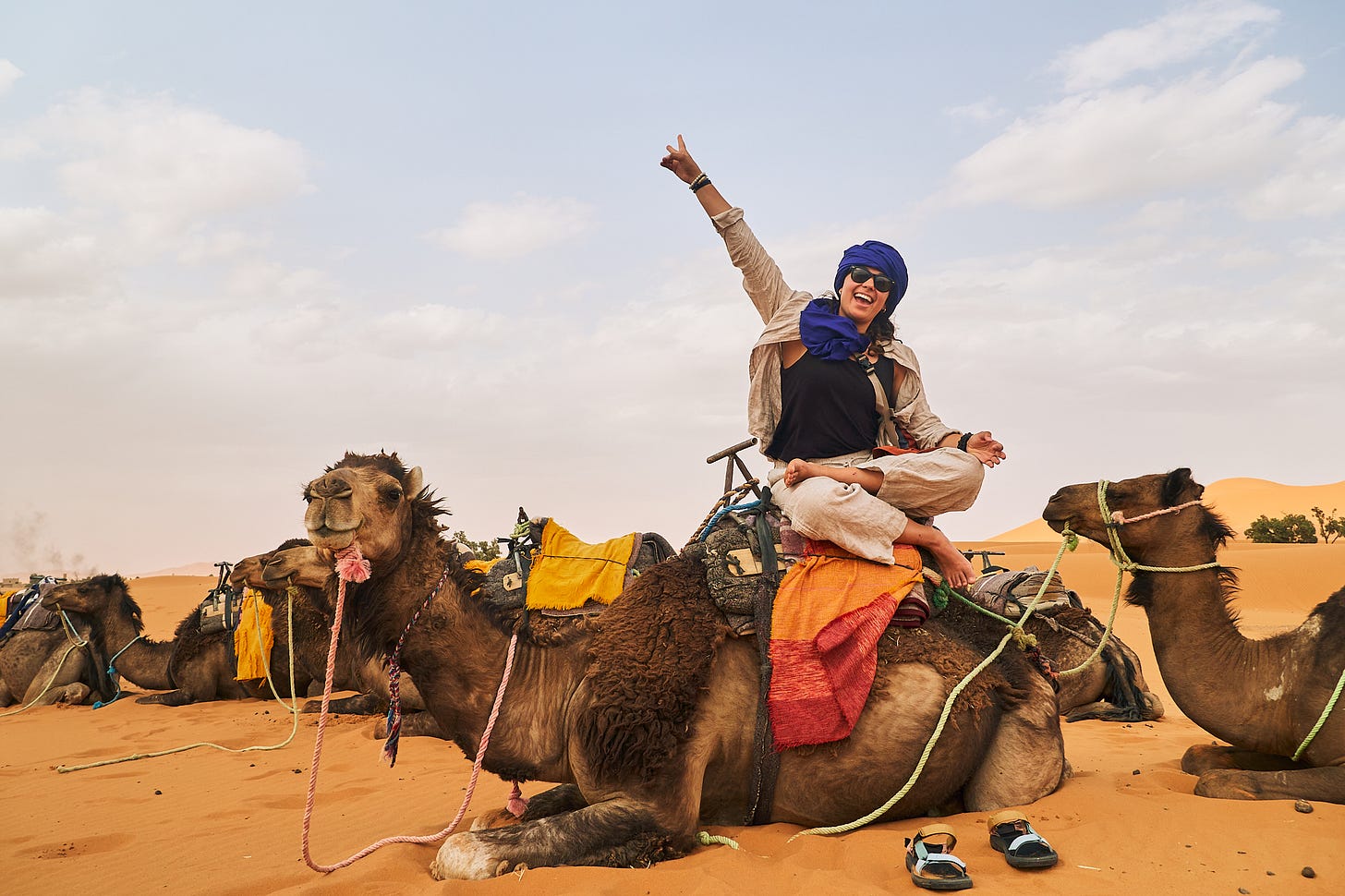
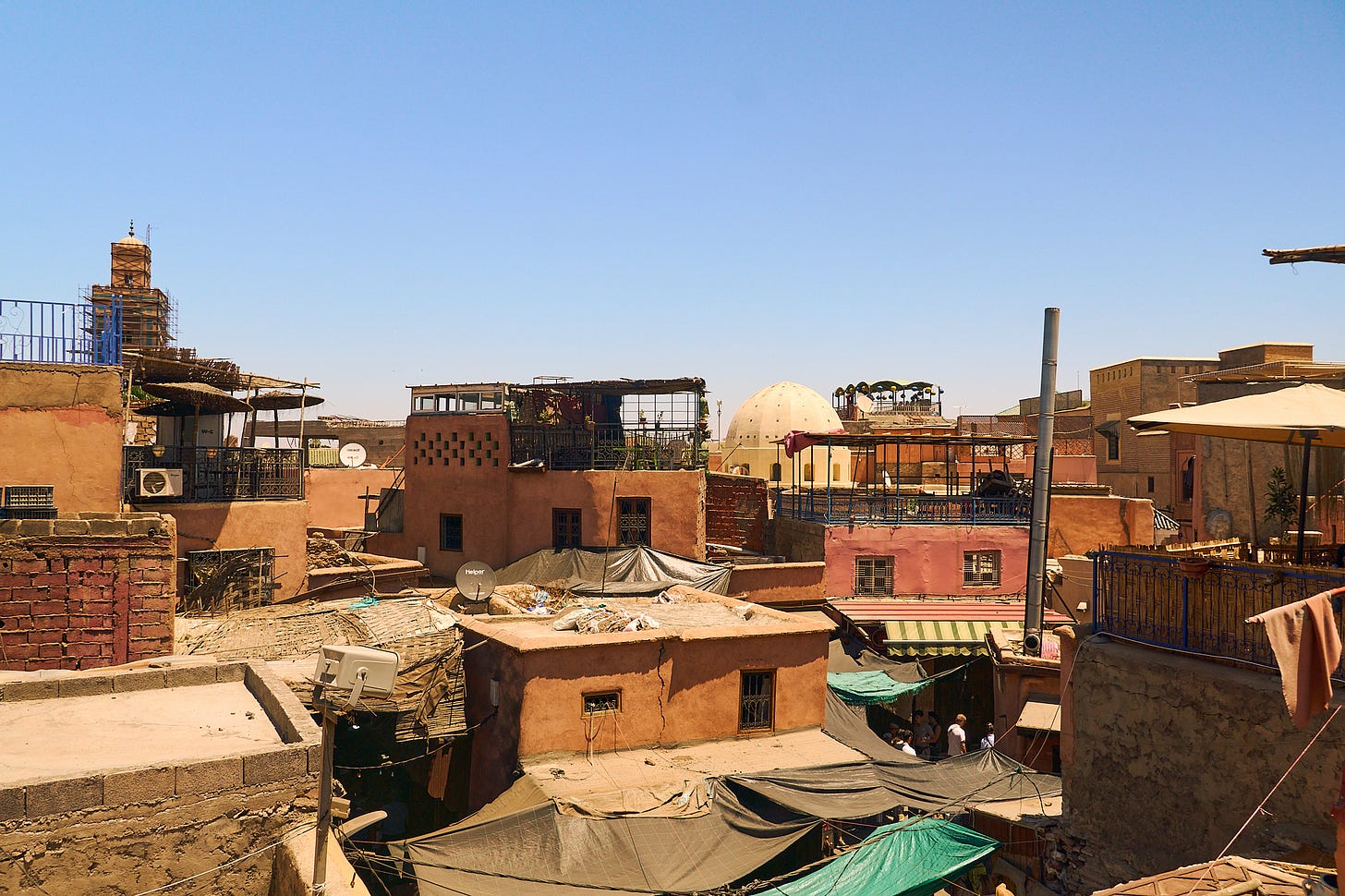
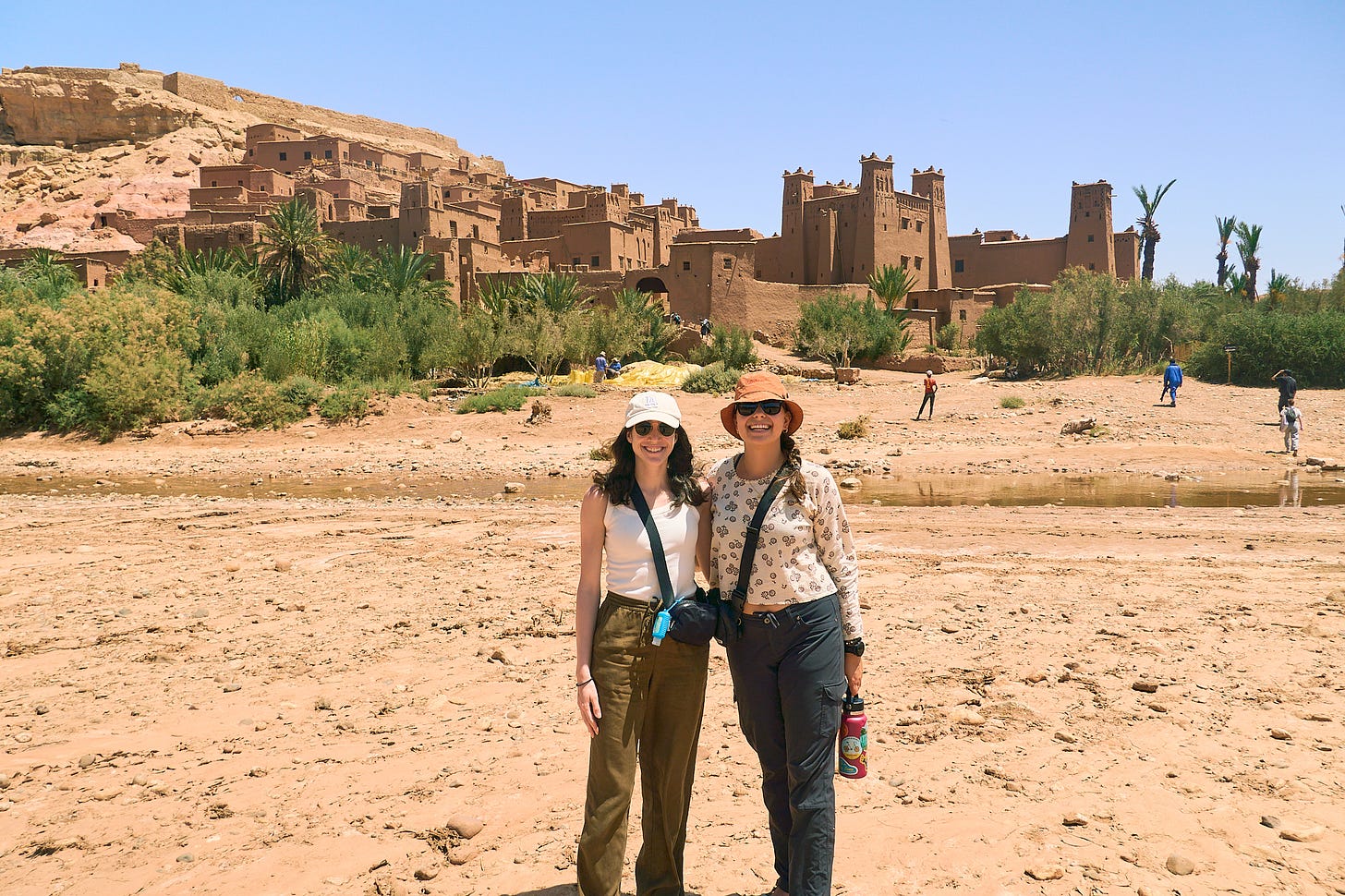
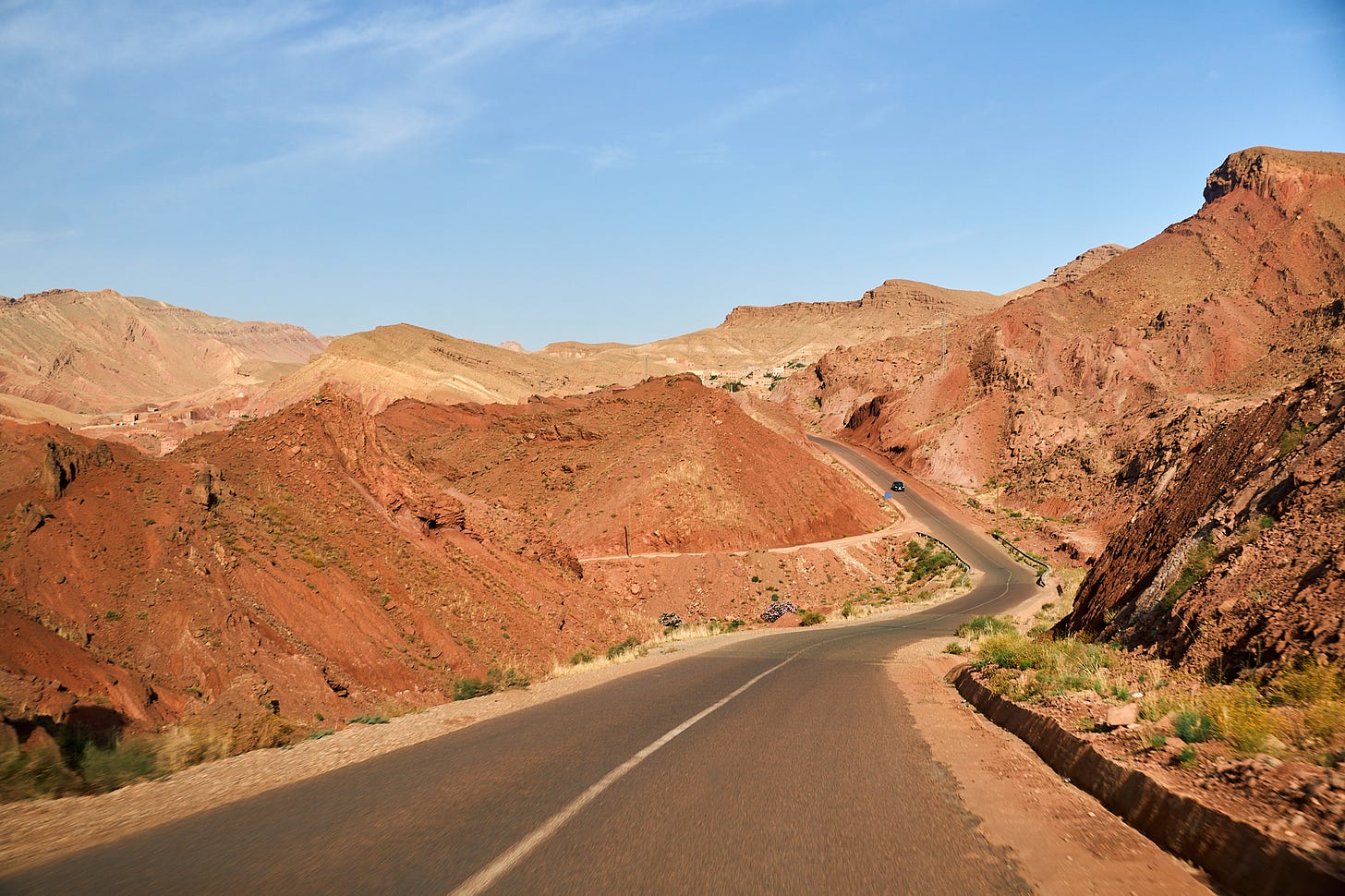
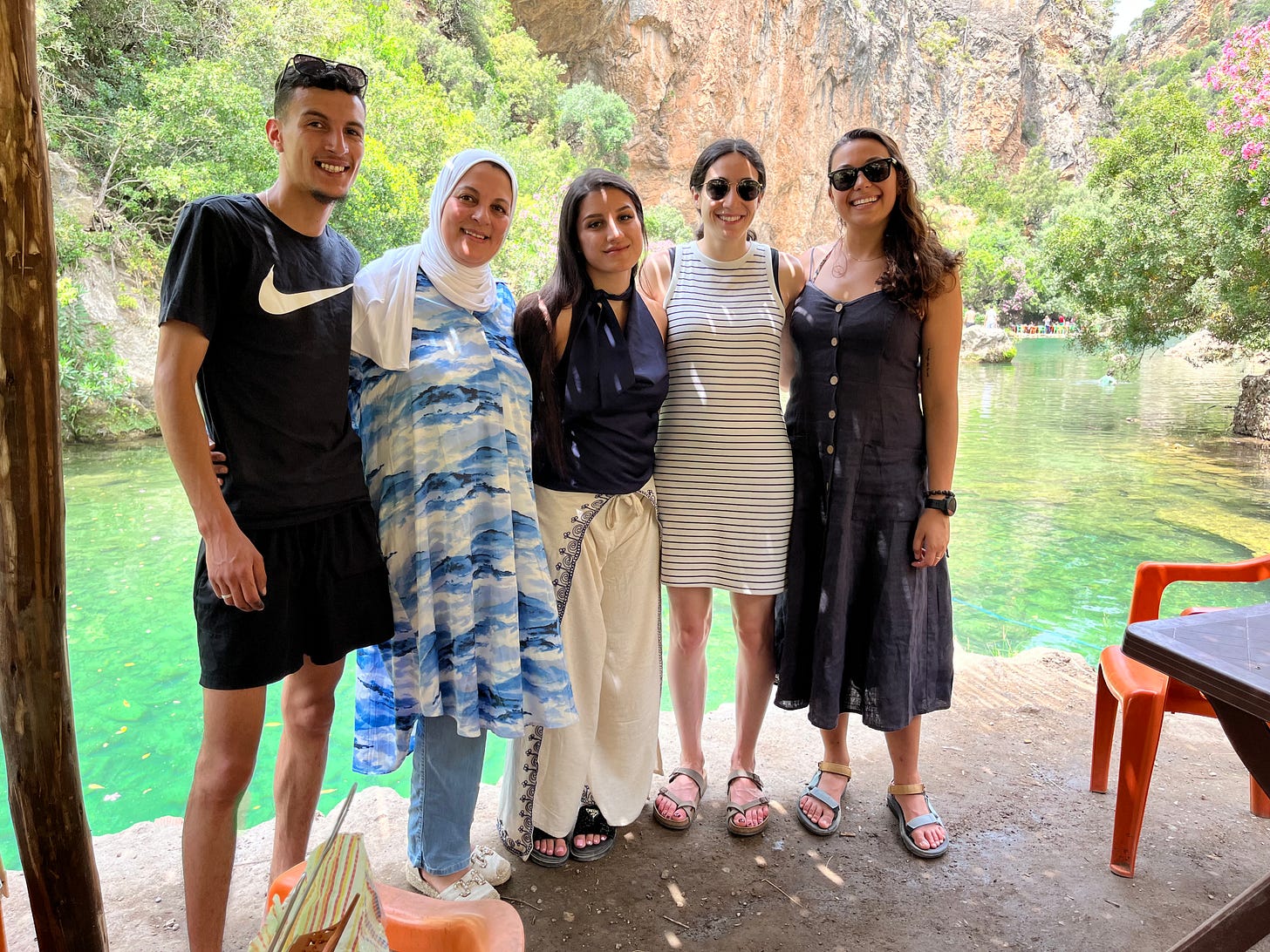
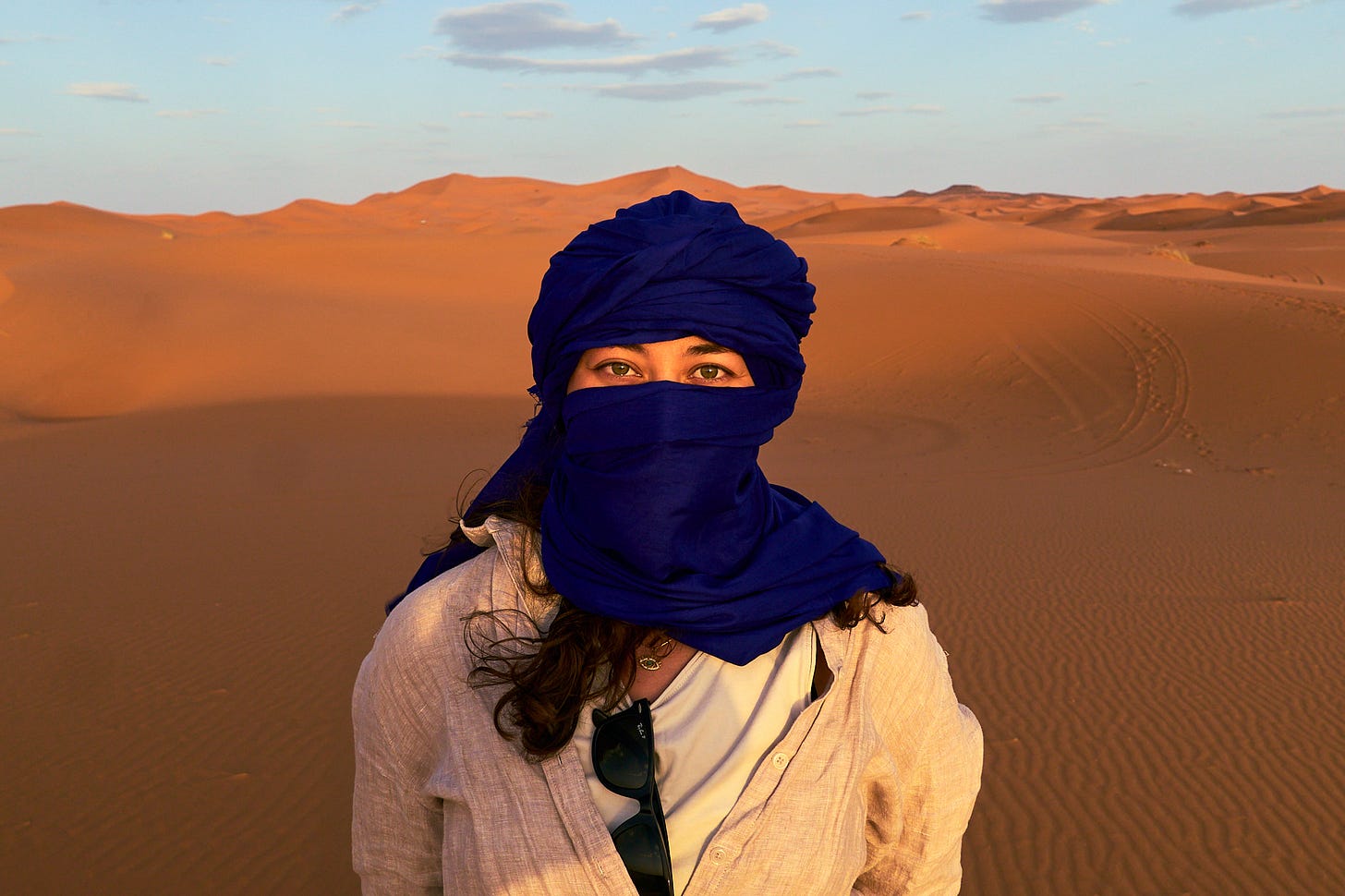
Wow! That was excellent. Your words about accepting the chaos are universal and transcending. You didn’t just read those words but lived them. Wishing you a meaningful solstice means standing still. We need to be still in order to integrate our experiences and feelings. As always, thank you 🙏.